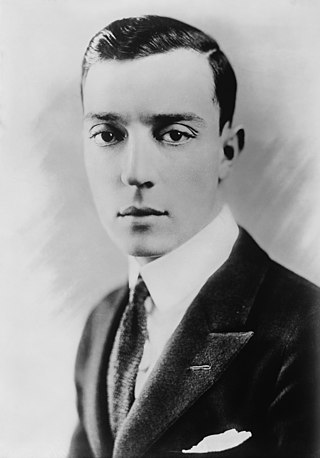
Joseph Frank "Buster" Keaton was an American actor, comedian and director. He is best known for his silent film work, in which his trademark was physical comedy accompanied by a stoic, deadpan expression that earned him the nickname "The Great Stone Face".

The Hollywood Revue of 1929, or simply The Hollywood Revue, is a 1929 American pre-Code musical comedy film released by Metro-Goldwyn-Mayer. It was the studio's second feature-length musical, and one of their earliest sound films. Produced by Harry Rapf and Irving Thalberg and directed by Charles Reisner, it features nearly all of MGM's stars in a two-hour revue that includes three segments in Technicolor. The masters of ceremonies are Conrad Nagel and Jack Benny.

Lionel Barrymore was an American actor of stage, screen and radio as well as a film director. He won an Academy Award for Best Actor for his performance in A Free Soul (1931), and is known to modern audiences for the role of villainous Mr. Potter in Frank Capra's 1946 film It's a Wonderful Life.
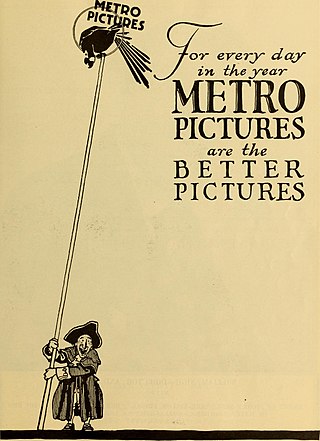
Metro Pictures Corporation was a motion picture production company founded in early 1915 in Jacksonville, Florida. It was a forerunner of Metro-Goldwyn-Mayer. The company produced its films in New York, Los Angeles, and sometimes at leased facilities in Fort Lee, New Jersey. It was purchased in 1919.

A Yank at Oxford is a 1938 comedy-drama film directed by Jack Conway and starring Robert Taylor, Lionel Barrymore, Maureen O'Sullivan, Vivien Leigh and Edmund Gwenn. The screenplay was written by John Monk Saunders and Leon Gordon. The film was produced by MGM-British at Denham Studios.

Kathleen Key was an American actress who achieved a brief period of fame during the silent era. She is best remembered for playing Tirzah in the 1925 film Ben-Hur.

Marceline Day was an American motion picture actress whose career began as a child in the 1910s and ended in the 1930s.
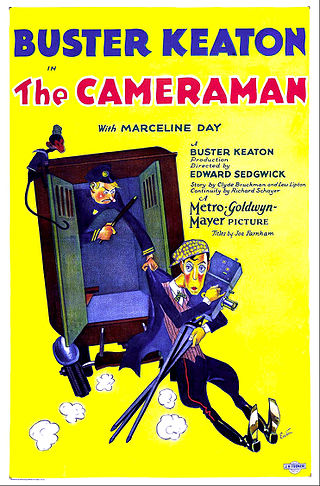
The Cameraman is a 1928 American silent romantic comedy film directed by Edward Sedgwick and an uncredited Buster Keaton. The picture stars Keaton and Marceline Day.

Edward Sedgwick was an American film director, writer, actor and producer.
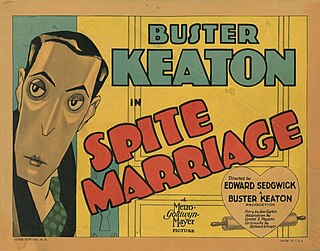
Spite Marriage is a 1929 American synchronized sound comedy film co-directed by Buster Keaton and Edward Sedgwick and starring Keaton and Dorothy Sebastian. While the film has no audible dialog, it was released with a synchronized musical score with sound effects using both the sound-on-disc and sound-on-film process. It is the second film Keaton made for MGM and his last film without audible dialogue, although he had wanted it to be a "talkie" or full sound film. Keaton later wrote gags for some up-and-coming MGM stars like Red Skelton, and from this film recycled many gags, some shot-for-shot, for Skelton's 1943 film I Dood It.

Madam Satan or Madame Satan is a 1930 American pre-Code musical comedy film in black and white with Multicolor sequences. It was produced and directed by Cecil B. DeMille and starred Kay Johnson, Reginald Denny, Lillian Roth, and Roland Young.
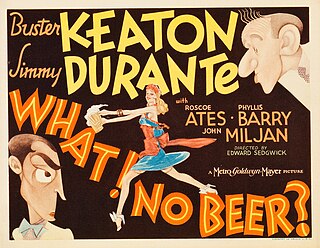
What - No Beer? is a 1933 Pre-Code comedy film released by Metro-Goldwyn-Mayer directed by Edward Sedgwick and starring Buster Keaton and Jimmy Durante. MGM had also paired Keaton and Durante as a comedy team during this period in The Passionate Plumber and Speak Easily.

Rasputin and the Empress is a 1932 American pre-Code film directed by Richard Boleslawski and written by Charles MacArthur. Produced by Metro-Goldwyn-Mayer (MGM), the film is set in Imperial Russia and stars the Barrymore siblings. It is the only film in which all three siblings appear together.

His Glorious Night is a 1929 pre-Code American romance film directed by Lionel Barrymore and starring John Gilbert in his first released talkie. The film is based on the 1928 play Olympia by Ferenc Molnár.
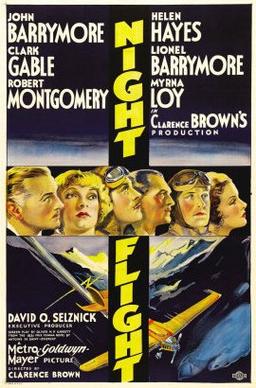
Night Flight is a 1933 American pre-Code aviation drama film produced by David O. Selznick, distributed by Metro-Goldwyn-Mayer, directed by Clarence Brown and starring John Barrymore, Lionel Barrymore, Clark Gable, Helen Hayes, Robert Montgomery and Myrna Loy.

The Buster Keaton Story is a 1957 American biographical drama film directed by Sidney Sheldon and written by Sidney Sheldon and Robert Smith, following the life of Buster Keaton. The film stars Donald O'Connor, Ann Blyth, Rhonda Fleming, Peter Lorre, Larry Keating and Jackie Coogan. It was released on April 21, 1957, by Paramount Pictures. The film was described by AllMovie as "sublimely inaccurate" regarding details of Keaton's life. It was produced by Paramount Pictures, which paid Keaton $50,000 for the rights to his life story.

Doughboys is a 1930 American Pre-Code comedy film starring Buster Keaton. It was Keaton's second starring talkie vehicle and has been called Keaton's "most successful sound Picture." A Spanish-language version was also made under the title, De Frente, Marchen.

Hollywood Cavalcade is a 1939 American film featuring Alice Faye as a young performer making her way in the early days of Hollywood, from slapstick silent pictures through the transition from silent to sound.
The International Buster Keaton Society Inc.— a.k.a. "The Damfinos"—is the official educational organization dedicated to comedy film producer-director-writer-actor-stuntman Buster Keaton.
Estrellados is a 1930 American pre-Code comedy film directed by Salvador de Alberich and Edward Sedgwick, and written by Salvador de Alberich, Paul Dickey and Richard Schayer. The film stars Buster Keaton, Raquel Torres, Don Alvarado, María Calvo, Juan de Homs and Carlos Villarías.


















